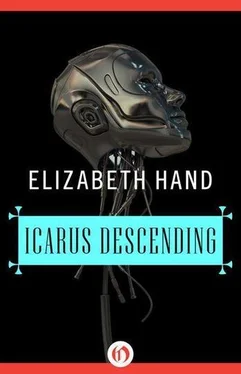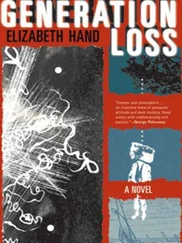She said, “O Kalamat, a strange thing has come to Quirinus. The Tyrant Medusine Kovax has been given to the Ether—”
(—that is, her corpse had been thrust through the air locks into the void, because there is no room within the HORUS colonies for the dead—)
“—and many others of our Masters are sick, or mad. I think they may be dying.” She looked around anxiously, fearful of being heard by a Master who might mistake her message for one of treason. “Please, Kalamat—”
I was bent over a console, supervising the repair of one of the solex panels that give breath and light to Quirinus. It was my duty, an important one if tedious. I knew that I was supposed to feel honored to have such a task. On Quirinus lived members of the Ascendant Autocracy, who from the relative safety of their orbital stations ruled what remained of the poisoned Element. Those of us who served them were constantly reminded of our great fortune, that we would live our thousand days in HORUS and never have to look upon that blighted world.
Still I dreamed of it, and was dreaming now even as I worked. So when Cumingia crept up behind me, at first I did not hear her. When I turned, it was as though I turned to gaze at myself in a mirror—eyes, hands, face, mouth, all save the spot where Cumingia had carved her left breast and upon the smooth scar that remained incised the image of her inner self, the Cumingia, a shell from the seas of the Element. Cumingia’s duty was to guard the docking chamber of Quirinus. So she had been the first to greet the delator Horacio Baklas when he arrived, ostensibly to serve our Masters as psychobotanist.
But his true mission soon became known to us. He was one of those humans who had joined the geneslave rebellion, though at that time we knew nothing of the Alliance. Under pretense of carrying with him a new shipment of spores for our pharmacy, he had instead brought irpex irradians, the radiant harrowing, one of the thousand Tyrant plagues that have been set loose upon the Element. But we did not know that yet. We had yet to hear of the Asterine Alliance; yet to hear of the Oracle, or the rumors that our father finally had risen from his long sleep to reclaim his enslaved children.
“She is dead?” I stopped my work, scratching my head absently. “You are certain, sister?”
Cumingia nodded excitedly. “She claimed that she saw her father and brother coming to her through the air lock. She commanded me to open it, so that she could greet them. I watched as the Ether took her, and came here to tell you.”
I frowned. It was not a good thing, for one of my sisters to witness a Master’s death. “Was there anyone with you? Were you alone?”
“The psychobotanist Horacio Baklas was with me. He laughed and laughed to see her die. I believe he has brought a plague with him.”
And so it was, as we learned over the next few days. First Medusine, then Vanos Tiberion, then Hosi and Ahmet, and finally all the rest, all of our Masters died. Hosi impaled himself. Ahmet and Lisia Manfred took themselves together to bed until the plague passed over them and the chamber smelled of the sweetness of their blood. For the rest it was quick madness or the lingering hours while their blood turned; but for all of them it was death. One by one we brought their corpses to the air lock and watched them slide into the void. I felt no sorrow, to see their pale bodies floating past. We energumens, the cloned children of Luther Burdock, live only one thousand days apiece, and outside of Quirinus the Ether is full of the bodies of our kin. There are many more of our dead than there are of humans in that void outside the HORUS station, hanging motionless but seeming to move in slow mournful circles as the station spins upon its orbit. It seemed a small enough offering, to let the bodies of our Masters join ours in the darkness. So one by one we gave them to the Ether, until only Horacio Baklas remained.
“Thus you are avenged!” he cried to my sister, she who is called Polyonyx because of the anomuran crab that is drawn upon her left breast. “I have waited three years, but it is done now.”
He seemed saddened, Polyonyx told me later; but that is the way with our Masters. They bring about the deaths of their own kind, and then pretend regretfulness. He gazed at my sister and suddenly smiled. “You are free now, Polyonyx. All of you—your Tyrant Masters are dead. It was a specially designed virus, you have nothing to fear from it. You are free, child. You may go.”
“Go?” My sister frowned. It was odd, to be called child by a human small enough to sit upon your knee. She told me later that she thought this man Horacio Baklas must be mad. “Where will we go? We have jobs to do, here—”
Horacio Baklas shook his head. He was small, even for a man; he barely came up to my sister’s waist. “No more, Polyonyx.”
(That was another odd thing about him—he called us by the names we have given ourselves. Our Ascendant Masters call us all by one name, Kalamat. When there are males among us, they are named Kalaman. But Horacio Baklas insisted upon learning our true names.)
“Haven’t you heard?” he went on. “There is a war on Earth—what you call the Element—war between the human Tyrants and the geneslaves.”
Polyonyx looked puzzled. “War?” We had heard of wars, of course; the reason we were on the HORUS station was to serve our Masters while they planned their endless attacks upon other humans in other space colonies and on the continents below. It is something we can never understand about humanity. They are such barbarians that the ones who call themselves the Ascendants—our Masters—wage war upon their brothers in the Archipelago and the Balkhash Commonwealth and the Habilis Emirate, and in other places upon the Element. It is because there is not enough to eat there; or so I have been told. But to us the Masters are all as one evil thing. They are not like us, or the other geneslaves. Their origins go back aeons, to animals that they hold in contempt; they do not have the hands of Dr. Luther Burdock upon them. “We have not been told of this.”
He nodded. His face had that fanatical glow that comes so easily to humans. “Yes! For three years now we have worked in silence, planning, planning—and now the time has come. Your time has come—”
Unfortunately he now began to rave, claiming he saw our father, Dr. Burdock, walking to meet him through the empty chamber. After a few minutes he keeled over, his face twisted into that rictus of inspired glee that was to become all too familiar to us through transmissions from the battlefronts below.
Polyonyx watched nonplussed, finally picked him up and carried him to Cumingia, who was still tending the infirmary, though there were no longer any humans to minister to.
“This one is dead, too,” said Polyonyx. She gave the body to Cumingia, who shook her head sadly. “He said there is a war on the Element—on Earth—he said that the geneslaves have rebelled.”
At this news Cumingia grew agitated and called me. I notified the others, all of us who remained on Quirinus, and we gathered in the circular meeting chamber that our Ascendant Masters had called the War Room. There I looked into the faces of my sisters. There were thirty-three of us, all identical except for the color of our skin and the occasional cicatrix or tattoo drawn where a breast had been removed in our ritual offering to the Mother. High overhead the lamps flickered to a soft violet, signaling that evening had come to the station. The sweet scent of chamomile hung in the air, where my sisters Hylas and Aglaia had bruised the tiny flowers grown in our gardens and set them to steep in wide, shallow steel basins. When I counted that all of my sisters had arrived, I raised my arms. After a moment the chamber grew silent.
Читать дальше












